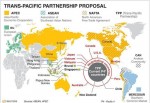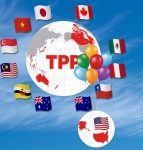TPP receives kiss of life
 |
| Renamed as the Comprehensive and Progressive Agreement for Trans-Pacific Partnership, the TPP gains a new lease on life |
According to a Trans-Pacific Partnership ministerial statement released just an hour ago, the Trans-Pacific Partnership (TPP) will continue to be materialised under the new name of “Comprehensive and Progressive Agreement for Trans-Pacific Partnership (CPTPP).”
“The ministers are pleased to announce that they have agreed on the core elements of CPTPP. Ministers agreed to Annex 1 and H, which incorporates provisions of the TPP, with the exception of a limited set of provisions which will be suspended. This text also incorporates a list of four specific items for which substantial progress was made but consensus must be achieved prior to signing,” said the statement.
Ministers agree that the CPTPP maintains high standards, overall balance, and the integrity of the TPP, while ensuring the commercial and other interests of all participants and preserving their inherent right to regulate, including the flexibility of the parties to set legislative and regulatory priorities.
Ministers also affirmed the right of each party to preserve, develop, and implement its cultural policies. Ministers consider that the CPTPP reflects the desire of the parties to implement TPP outcomes among themselves.
In January this year, the US withdrew from the TPP, with the 11 remaining member nations, namely Australia, Brunei, Canada, Chile, Japan, Malaysia, Mexico, New Zealand, Peru, Singapore, and Vietnam showing strong determination to keep the TPP process afloat.
“Ministers have made great efforts to ensure that CPTPP must be a pact with the highest standards and quality, meeting all demands, interests, and benefitting the 11 nations. Especially, the new pact must ensure feasible enforcement,” Vietnamese Minister of Industry and Trade Tran Tuan Anh told VIR.
“After the US withdrew from the TPP, nations obviously faced some difficulties. However, the biggest difficulty was to reach unanimous consensus on the feasibility of the TPP, or now CPTPP,” Tuan Anh said.
When they last met in Hanoi on May 21, 2017, the ministers of Australia, Brunei Darussalam, Canada, Chile, Japan, Malaysia, Mexico, New Zealand, Peru, Singapore, and Vietnam reaffirmed the balanced outcome and the strategic and economic significance of the TPP Agreement signed in Auckland in February 2016.
In particular, leaders highlighted the agreement’s principles and high standards as a way to promote regional economic integration and contribute to the economic growth prospects of its member economies, and create new opportunities for workers, families, farmers, businesses, and consumers.
In May, ministers tasked officials to engage in a process of assessing options to bring the comprehensive, high quality agreement into force. Over the past several months, officials have worked to reach a balanced outcome that maintains the significant benefits of the TPP.
“Ministers confirm that the legal instrument proposed for the CPTPP allows participants to act decisively in a timely manner to advance their shared objectives,” said the ministerial statement. “Ministers reaffirmed that the CPTPP demonstrates their firm commitment to open markets, to combat protectionism, and to advance regional economic integration.”
Ministers tasked officials to continue their technical work, including continuing their efforts toward finalising those items for which consensus has not yet been achieved, and legal verification of the English text and translation, to prepare a finalised text for signature.
“Ministers recognise that each country will need to pursue its own domestic processes, including public consultation before signing,” read the statement.
| “Reasonable chance” for TPP at APEC 2017 After US President Donald Trump announced the US’ withdrawal from the Trans-Pacific Partnership (TPP) Agreement, history’s largest trade deal to date congregating around 40 per cent of the world’s economy seemed to have fallen through. However, the eleven remaining member states decided to go ahead with the deal and may well reach a revised agreement at APEC Vietnam this November. |
| TPP countries forge ahead without US The government officials in charge of trade from the remaining 11 member states of the Trans-Pacific Partnership Agreement have agreed to continue with the agreement, despite US’ withdrawal. |
| RCEP enters a post-TPP void Following the uncertain future of the Trans-Pacific Partnership due to US withdrawal, special attention is now being given to the under-negotiation Regional Comprehensive Economic Partnership – RCEP – led by China. Tim Harcourt, former chief economist of the Australian Trade Commission and now professor of economics at University of New South Wales, spoke with VIR’s Thanh Tung about Vietnam’s trade future in RCEP’s huge market of over 3.4 billion people. |
| TPP member states commit to regional economic, trade integration Member states of the Trans-Pacific Partnership (TPP) committed to seeking a new path to promote regional economic and trade integration during a high-level meeting in the Chilean city of Vina del Mar on March 15. |
| Asia-Pacific seeks to save TPP trade deal without US VINA DEL MAR, Chile: Asia-Pacific ministers said on Wednesday (Mar 15) they would seek to move forward on a trade agreement resembling the Trans-Pacific Partnership after President Donald Trump killed the deal by withdrawing the United States. |
| TPP flop a thorn in rosy future Though the US has cancelled its participation in the Trans-Pacific Partnership, which is expected to have drawbacks for both Vietnam and the US, Vietnam’s economic outlook remains bright without the deal. Sesto Vecchi, managing partner of US law firm Russin & Vecchi, gives VIR his analysis. |
| Growth remains without TPP Vietnam was the country with the most to gain from the Trans-Pacific Partnership. Increased market access, especially to the US, would have supported an export manufacturing boom and outsized GDP growth in what is already one of Southeast Asia’s fastest growing economy. |
What the stars mean:
★ Poor ★ ★ Promising ★★★ Good ★★★★ Very good ★★★★★ Exceptional
More News
- MM Mega Market to provide more than 50 tonnes of foodstuff for APEC 2017 events (November 10, 2017 | 22:29)
- Sanofi Vietnam and Vinapharm ratifies strategic partnership (November 10, 2017 | 13:00)
- Japanese firms sign $5-billion raft of deals with Vietnam (November 10, 2017 | 11:00)
- TH Group makes an impression at APEC (November 07, 2017 | 20:48)
- Concluding Senior Officials' Meeting wrapped up in Danang (November 07, 2017 | 17:00)
- Ford’s continuing efforts to make Vietnam’s roads safer (November 07, 2017 | 16:08)
- Viet Nam is trying to improve itself: PM (November 07, 2017 | 15:34)
- PM delivers keynote speech at Viet Nam Business Summit (November 07, 2017 | 11:34)
- APEC Vietnam 2017 special publication now available (November 07, 2017 | 11:32)
- Four Vietnamese entrepreneurs to attend APEC CEO Summit (November 06, 2017 | 20:38)


















 Mobile Version
Mobile Version